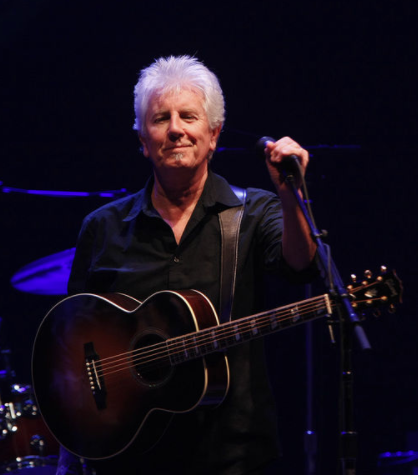Graham Nash still alive, feeling and writing

By Andrew S. Hughes South Bend Tribune
Graham Nash wrote “Teach Your Children” at the height of one of the most divisive periods in the United States’ history.
But that 1970 Crosby, Stills, Nash & Young hit took a conciliatory, empathetic approach to the generation gap that divided parents from the generation that fought in World War II and their children who opposed the Vietnam War.
“That was my point,” Nash says by phone from Vermont on a two-man tour with current collaborator and producer Shane Fontayne that includes Friday’s concert at Four Winds Casino in New Buffalo.
He wrote the song in response to an exhibition of photographs drawn from his collection. The gallery owner had paired Diane Arbus’ “Child With Toy Hand Grenade in Central Park” with Arnold Newman’s portrait of the Krupp family, which supplied Nazi Germany with much of its weaponry during World War II.
“When I saw these things together, I thought, if we don’t teach our children better, we’re (expletive),” Nash says. “That’s what ‘Teach Your Children’ is about, and the ability to learn from them as well as teach them.”
Within Nash’s catalog of songs, “Teach Your Children” is one of many — “Military Madness,” “Barrel of Pain,” “Immigration Man,” among them — that tackle war and social, political and environmental issues.
But for his most recent album, 2016’s “This Path Tonight,” Nash emphasizes the personal side of his writing, of which 1970’s cozy “Our House” is probably the best-known example from his career.
“Very much so,” he says about the new album’s focus on the personal. “This is a map of my emotional journey that I’ve been on for the last few years.”
Before he began “This Path Tonight,” Nash and his wife of almost 40 years divorced, he moved to New York City from Hawaii, and he began a new relationship with artist Amy Grantham.
Throughout the introspective album, he approaches its subjects with directness and honesty as he sings about the risk of starting a new relationship in his 70s, his artistic legacy and his own mortality.
On “Back Home,” for example, he sings, “Take your time, ’cause time will take you,” and on “Myself at Last,” he sings, “The question haunting me/‘Is my future just my past?’”
“I think that’s my job,” he says. “My job is to be honest, and my job is to reflect the times in which we live. … I’m still alive and still checking everything out and feeling, and I’m still writing.”
Born Feb. 2, 1942, Nash co-founded The Hollies in 1962 and first came to the U.S. as part of the British Invasion.
“Thrilling,” he says about that period. “You’re supposed to do what your dad did or your grandfather. You’re supposed to go down in the mine or to the mill. We were able to escape that. It was thrilling to become a musician. My mother and father always encouraged my music, and I’ll be forever grateful.”
In 1968, Nash left The Hollies to form CSN with David Crosby and Stephen Stills, who had been in The Byrds and Buffalo Springfield, respectively. Stills’ Buffalo Springfield band mate Neil Young joined in August 1969.
CSN and CSN&Y quickly garnered acclaim for their intricate, distinctive vocal harmonies.
“It was incredibly intuitive,” Nash says about their approach to harmony. “The Hollies and the Springfield and The Byrds were damn fine harmony bands, but when David and Stephen and I sang together, it was a completely different sound. We had never heard anything like it before.”
But CSN and CSN&Y have also taken several and sometimes lengthy breaks from performing and recording together. Nash and Crosby released four studio albums and several live and compilation albums as a duo, and Nash began his solo career in 1971 with “Songs for Beginners,” which, like of all of his collaborations and solo work, mixed the personal and the political with its song selection.
For “This Path Tonight,” he primarily reserves the political for two of the three bonus tracks on the deluxe edition: “Mississippi Burning,” about the 1964 murders of three civil rights workers, and “Watch Out for the Wind,” about the aftermath of the shooting of Michael Brown.
As he did with “Teach Your Children,” Nash initially takes a diplomatic stance regarding the Trump administration.
“I boil it down very simply,” he says. “I think America is an incredibly great country. I think it has great potential. I’ve been an American citizen for over 40 years, but I truly think we deserve better.”
But he later adds that he jokingly calls the administration “a no-brainer” and gets specific with some of his criticisms.
“We’re watching this clown car, with people getting in and out of it, and while we’re watching that, they’re doing terrible things,” Nash says. “To pull out of the Paris Accord is insane. To put somebody in charge of the EPA who’s a climate change denier is insane. They’re playing with our lives and they’re incredibly hypocritical.”
So far, however, he has yet to write any songs about Trump.
“I have a feeling something’s coming out,” Nash says. “I know it, because I’ve done 16 paintings of incredible chaos. I’ve been responding with painting this time, but I know I’ll get back into music.”